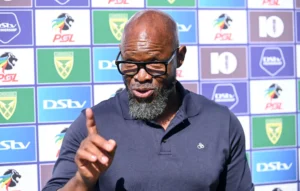TENNIS TITAN HITS OLYMPIC HIGH
In an exciting new achievement for local sport, last month Goane Poane became the first tennis official to represent the nation at the Olympics.
The 33-year-old umpire was selected as a Line Judge for the Tokyo 2020 Olympics.
As well as flying the flag high for Botswana, Paone was also the sole female African representative to officiate at the tennis.
For the Palapye native, it represents the latest high in a sport she only took up at college in a bid to lose weight!
While she struggled to mark her mark on court, she has excelled on the sidelines.
In this interview, the vastly experienced umpire reflects on a career that started in 2016 and has gone from strength to strength ever since.
Congratulations on your recent gig at The Tokyo Olympics. How did it feel?
It is a great honour and privilege to be selected as the only umpire from this country to officiate such a major event.
This was my very first Olympics and I was very excited. I could not believe it until the very last day when I boarded the plane.
This shows that I am doing something right.
Truly. Sadly, due to Covid-19, there were no fans allowed in the stadia. What’s it like officiating a game without a crowd?
It was very different and quite. The crowd makes you enjoy officiating but this time it was only coaches, athletes and few officials.
So it makes a difference from an official’s perspective?
Definitely! Sometimes the crowd does keep the match alive, the excitement, the mood and it also keeps you on your toes because you will not want to make a mistake when the stadium is fully packed.
We understand that it is due to the pandemic and we are hoping to have spectators in the next major games.
Did you take part in the opening ceremony?
No. The ceremony was only for the athletes and not the whole team because of the pandemic.
I wish to be part of it in the future if I get selected to officiate in the next Olympics in Paris.
Take us through a typical ‘Tokyo 2020’ day for you?
(Laughing) I wake up, take a shower, go to the restaurant for breakfast.
Then I go back to my room, get dressed in my officiating uniform, go to the shuttle and go to the tennis venue.
At the venue we first do our daily PCR Covid-19 testing.
Then go for a meeting and get assignments for the day and work until the last match.
Then go back to the hotel to shower and sleep. It was hectic!
Talking about hectic, professional tennis is played at a frightening pace – do you follow any special exercises/training to ensure your eyesight is in tip-top shape?
It comes with experience. The more matches you officiate the more your eyesight is accustomed to doing a match at a full pace.
The only thing that you need to always remember is to be focused and every point is important – first, middle and the last point.

Yes we are bound to make mistakes but we try to be as accurate as possible. I do sometimes exercise but not every day.
Is umpiring a full time job?
Yes it is but I have a small business that I run on the side.
I have Supplies and Cleaning company called Poanovic. Tennis takes 80 percent of my time.
So how did you get into officiating?
In 2014, Botswana hosted Youth Africa Games and I saw tennis officials that I always see on television.
I watched them officiating and I developed interest. I approached Botswana Tennis Association management and they sponsored my training.
In 2015, I went for training in South Africa at Stellenbosch University.
I did the course and passed theory and practical examination.
I was certified as an international White Badge chair umpire.
And what about your sporting background?
I played table tennis and javelin when I was at Junior School until Senior School.
When I was at college I continued playing tennis because I had wanted to lose weight.
I also enjoy watching athletics and swimming.
What does it take for one to be an umpire?
You have to do the course and pass your examinations.
You can go back to level three course and get the bronze badge and by promotion get silver badge and eventually gold.
What have been your greatest achievements as a player and an umpire?
As a player at school, nothing because I never got into the competitive side. I tried once and lost really badly!
As an umpire, there have been many. At the top of the list, is being selected to officiate at the Olympics because everybody aspires and works towards this major event, be it athletes or officials.
As a line umpire, I have officiated in almost all the Grand Slam qualifiers since 2016 when I started officiating matches.
Also, when I did Australian Open, Africa Games and many more. I feel like each and every tournament for me is an achievement because it is a step to make me a better official and I take it as a way to improve my career.
What advice can you give to aspiring tennis umpires?
Go for it! It is the most beautiful career. It gives you an opportunity to learn a lot of things because you get to interact with a lot of people across the world.
It allows you to expose yourself to different cultures. There are some officials who never played tennis before but they do amazingly as officials.
It is a challenging job but gives you a room for growth.
Who is your inspiration?
There are many tennis legends that I look up to that I had only seen on TV and I was very fortunate that I got to work with them at the Olympics.
I got to have conversations with them and asked them how they got to the level where they are. It is a long list
Now let’s get a bit more personal. Are you married with children? Your career sounds incredibly demanding and requires you to be away from home for prolonged periods which must be difficult on your loved ones?
I have no kids and I have an incredible man in my life who is very supportive of my career.
He supports everything that I do and pushes me to be my best.
Even though I have to travel and we spend some times apart, he is supportive and is in sport himself, so he understands.
What are your hobbies?
I love cooking, travel and learning new languages and watching television.
The beauty about my job is that I get to experience all these because I travel a lot, officiating in different countries.
I had to learn French because in some countries I have to score in that language.
And finally, Thank God It’s Friday, what are your plans for the weekend?
I am back home in Palapye with my family. I have been away for a long time so I have to spend time with them – besides I avoid unnecessary travels due to the Covid pandemic.




















